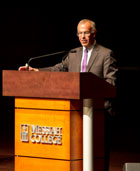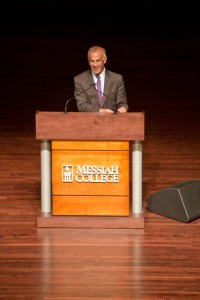The call to be countercultural
 On October 3, Messiah College proudly welcomed New York Times journalist and PBS NewsHour commentator David Brooks to address “The Importance of Humility and Civil Discourse in American Life.” Brooks currently acts as an op-ed columnist at the Times, a position which allows him to explore the various aspects of politics, culture and society. In addition to his success at the Times and on the air, the celebrated columnist has also gained widespread recognition as an author with the release of his books “The Social Animal: The Hidden Sources of Love, Character and Achievement,” “On Paradise Drive,” and New York Times best-seller “Bobos in Paradise.”
On October 3, Messiah College proudly welcomed New York Times journalist and PBS NewsHour commentator David Brooks to address “The Importance of Humility and Civil Discourse in American Life.” Brooks currently acts as an op-ed columnist at the Times, a position which allows him to explore the various aspects of politics, culture and society. In addition to his success at the Times and on the air, the celebrated columnist has also gained widespread recognition as an author with the release of his books “The Social Animal: The Hidden Sources of Love, Character and Achievement,” “On Paradise Drive,” and New York Times best-seller “Bobos in Paradise.”
Brooks began his lecture by inviting his audience to consider how morality, culture and politics all influence one another in the world today. According to Brooks, he considers the future of the political scene to appear rather bleak. However, contrary to popular American opinion, the dim circumstances cannot be solely attributed to Washington, but rather, there remains a much larger problem that is too often overlooked: the troubled state of our culture. So, the question then presents itself, who should we be pointing the finger at—Washington or ourselves?
To illustrate his point, Brooks took his audience back to a post-World War II American culture. At the culmination of the war, in the midst of one of the greatest national victories, Americans surprisingly shied away from pride and arrogance and instead embraced humility. Rather than boasting about their recent victory, the culture defeated self-glorification—a concept that is strangely foreign to culture today. As Brooks noted, if one wishes to get a taste of how modern American culture has drastically changed, simply turn on the television and consider the professional athletes who all have their own “victory dance.” How is it that our culture today praises a touch-down significantly more than it praised a WWII victory? According to Brooks the answer is simple. Our culture has turned from humility to arrogance, from modesty to conceit and from self-effacement to self-glorification.
 Brooks continued to analyze how our culture has shifted over time by considering historical figure Dwight Eisenhower. Eisenhower’s favorite verse was Proverbs 16:32 which was first presented to him in a conversation with his mother. The verse says, “Whoever is slow to anger is better than the mighty, and he who rules his spirit than he who takes a city.” Through this verse, Eisenhower understood the concept of a sin nature in a new way and, further, he recognized that conquering oneself is the key to true happiness and success.
Brooks continued to analyze how our culture has shifted over time by considering historical figure Dwight Eisenhower. Eisenhower’s favorite verse was Proverbs 16:32 which was first presented to him in a conversation with his mother. The verse says, “Whoever is slow to anger is better than the mighty, and he who rules his spirit than he who takes a city.” Through this verse, Eisenhower understood the concept of a sin nature in a new way and, further, he recognized that conquering oneself is the key to true happiness and success.
After considering Eisenhower, Brooks invited his audience to compare the former president’s thoughts with the popular views of today’s culture. Today, Americans are told to love themselves, trust themselves and, in essence, be their own god. According to Brooks, a study was conducted in 1950 which asked Americans if they believe they are important. Only a mere 12% answered “yes.” The study was re-conducted in 1985 and an astonishing 80% claimed they believed they were important. As Brooks stated, today’s narcissistic society has no concept of a sin nature and no concept of conquering oneself, leading to a rise in polarization, decreased social and government trust and a lack of communal morality.
After painting a somewhat bleak picture, Brooks encouraged listeners by claiming that the good news is that cultures can change. The key to battling narcissism and building character is to forget oneself and embrace humility. Consequently, one must redirect the focus off of oneself and onto other people. As C.S. Lewis phrased it, “If you meet a truly humble man, he won’t be thinking about humility; he won’t be thinking about himself at all.”
Story by Jess Kern `15. Photography by Lenora Riley `08.




